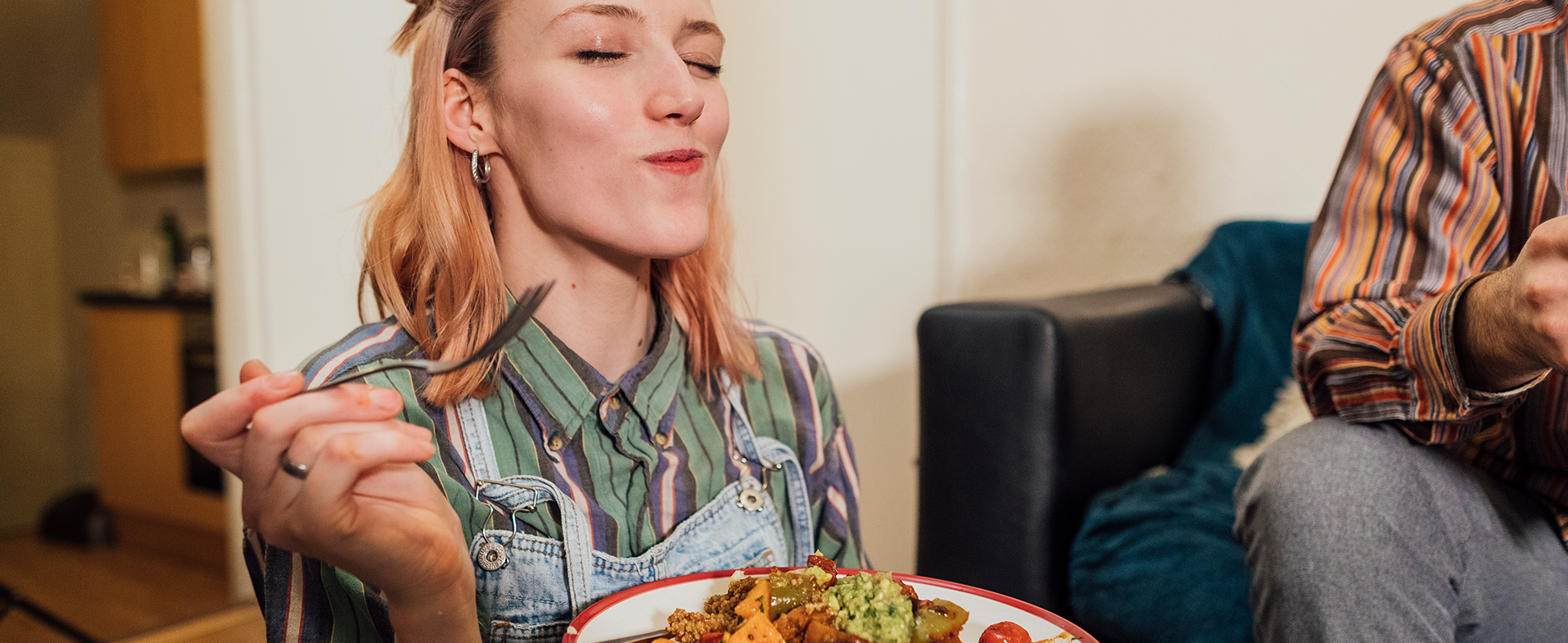An old saying claims you should “eat breakfast like a king, lunch like a prince and dinner like a pauper.” But is there any truth behind the adage?
According to Natalie Watha, RDN, a registered dietitian at Henry Ford Health, it’s not just an old wives’ tale. “It makes sense that breakfast should be larger, when your body is waking up and needs energy to fuel your day,” she says. “Eating smaller dinners can help with weight management and may benefit overall health.”
Small Dinners for Weight Loss and Health
Why does it matter what time you eat a big meal? Front loading your daily calories works with your body’s natural circadian rhythm, or internal clock. Research has shown that the body’s circadian rhythm plays a crucial role in how efficiently we metabolize food.
Our bodies are more sensitive to insulin in the morning. That means you can process blood sugar and store fat more effectively when you eat earlier in the day. “In the morning, your metabolism is more efficient,” Watha explains. “In the evening, your metabolism slows and you don’t break down food as efficiently.”
People who eat more in the morning, when metabolism is most efficient, may be more likely to lose weight (or maintain a healthy weight). In fact, a number of studies have found weight-loss benefits among people who eat bigger breakfasts and smaller dinners.
One study, for example, looked at people who consumed their daily calorie intake either in the morning or at night. Those who ate a bigger breakfast showed more significant weight loss and better insulin sensitivity. (Poor insulin sensitivity, also known as insulin resistance, can lead to prediabetes and diabetes.)
Other research has found evidence that people who eat big morning meals have better appetite control during the day and are less likely to overeat later in the day. Eating most of your calories earlier in the day may have other benefits besides weight management, Watha says, including:
- Better digestion
- Less acid reflux
- Improved sleep at night
- Increased energy levels during the day
Adopting a Circadian Rhythm Diet
Ready to try switching up your daily diet pattern? There’s one important caveat to consider first. People with health conditions like diabetes (including gestational, Type 1 and Type 2 diabetes) may need to carefully regulate their blood sugar throughout the day. If you have a health condition, talk to your doctor before changing your eating style.
But most healthy adults without underlying health problems can explore the idea of a breakfast fit for royalty. Watha shares her ideas for what such meals might look like.

Subscribe To Our E-Newsletter
Breakfast
“Aim for meals high in protein and fiber. They’ll provide the fuel your body needs and help you stay full through the day,” she says. Breakfast could be 1 cup of low fat Greek yogurt with 1 tablespoon of chia or flax seeds mixed in, topped with half a cup of a whole grain granola and a cup of mixed berries.
Lunch
Your midday meal should split the difference—not too big but nourishing enough to fuel your afternoon. Think a hearty kale salad with 1 cup of quinoa mixed in, topped with grilled salmon or chicken, a few slices of avocado or 1/4 cup of nuts, and a drizzle of oil-based dressing.
Dinner
If you’ve eaten plenty of protein and fiber during the day, you’ll be satisfied with a light dinner, Watha says. Try 3 ounces of grilled fish or plant-based options such as lentils or tofu with a small sweet potato and some roasted broccoli drizzled with a little olive oil.
If you’re used to dining like a king (or queen) at night, it can take some effort to shift your eating habits. These tips can help.
- Work your way up: People who aren’t used to eating much in the morning might balk at the idea of a king’s breakfast. Start small, Watha suggests. Start with a cup of yogurt and fruit in the morning. Once you’re used to that, make it a parfait with fruit, nuts and a sprinkling of bran flakes. Over time your body will adapt to feeling hungrier in the morning hours.
- Dial it back: Timing matters, too. If you don’t want to skip a big traditional dinner, plan to eat it earlier—say, 5:00pm instead of 8:00pm. “Aim to have your last meal or snack at least two to three hours before going to bed,” she says.
- Fit your life: It might not be feasible to eat this way every day, Watha says. If you have plans for a special night out and expect that dinner will be your largest meal of the day, you may need to adjust your breakfast and lunch portions. “It’s what you do most of the time that matters. It’s not an all-or-nothing mindset,” she adds.
Reviewed by Natalie Watha, RDN, a registered dietitian for Preventative Cardiology and the Clinical Weight Management Program at Henry Ford Health.



